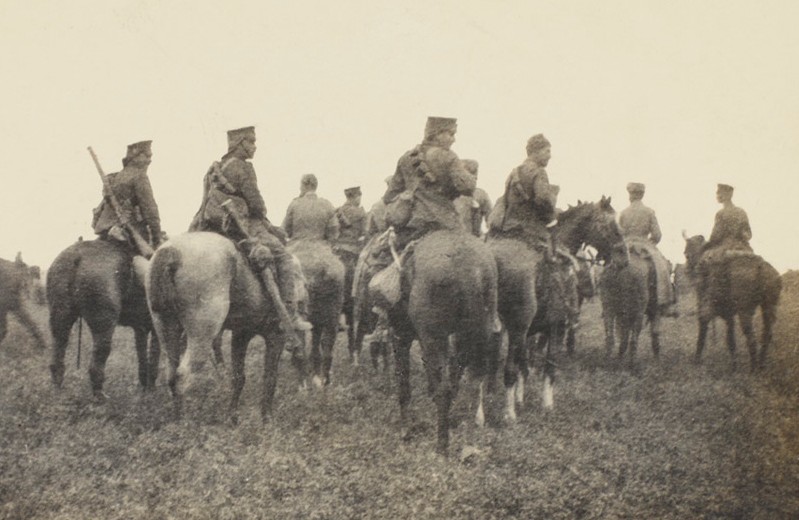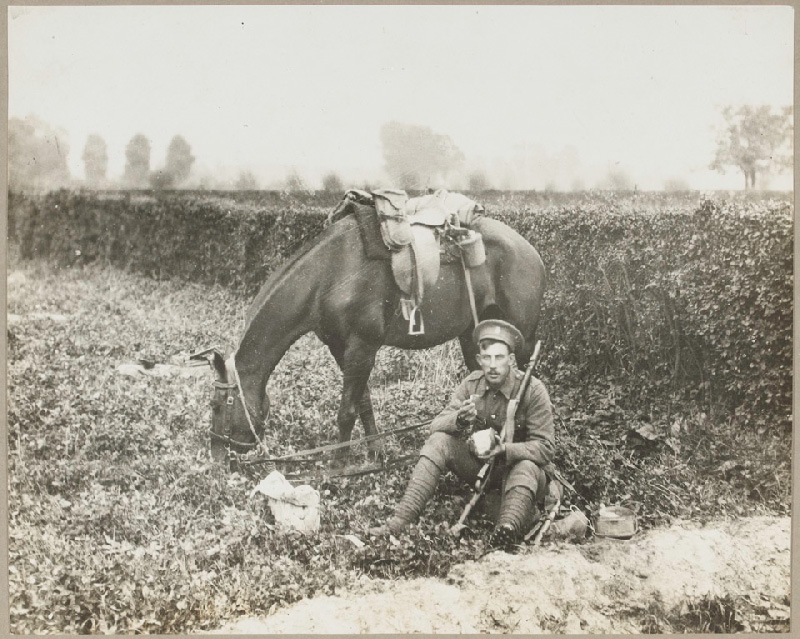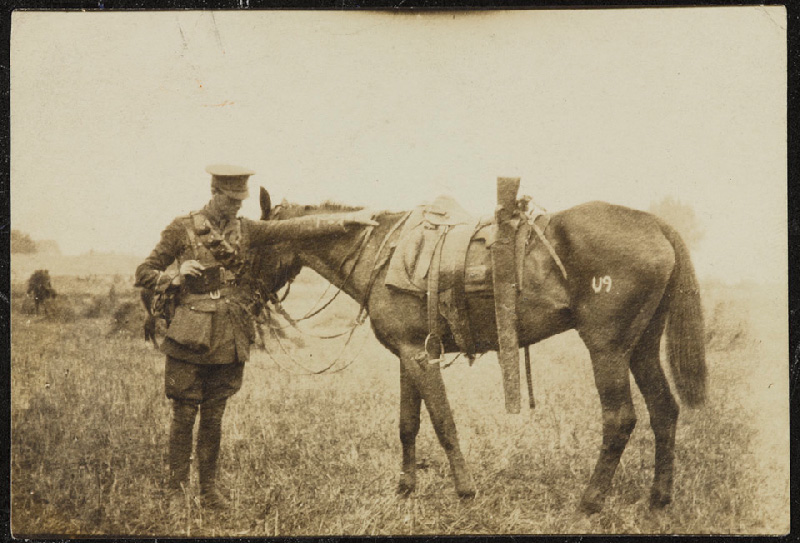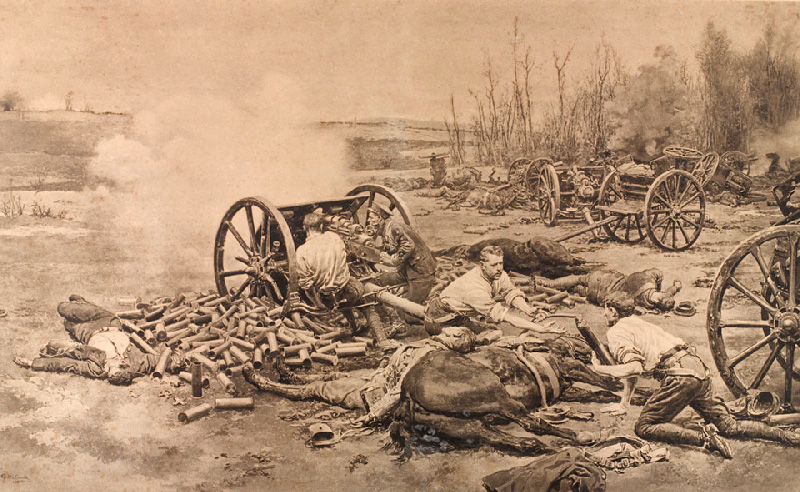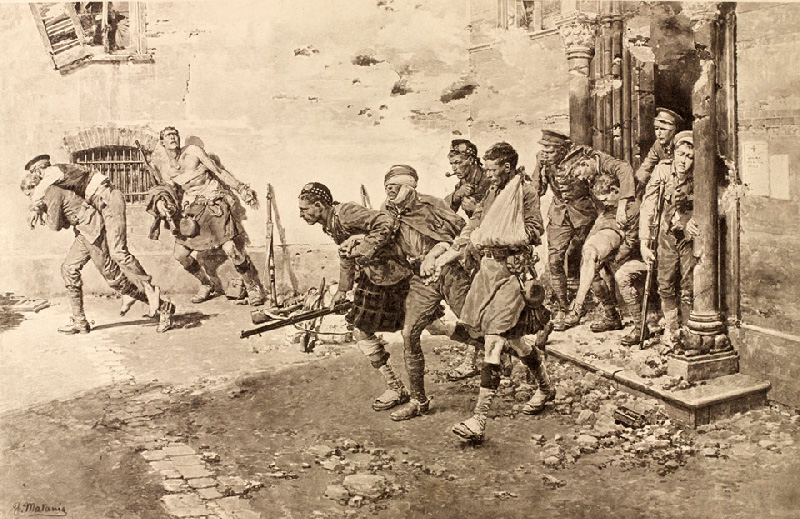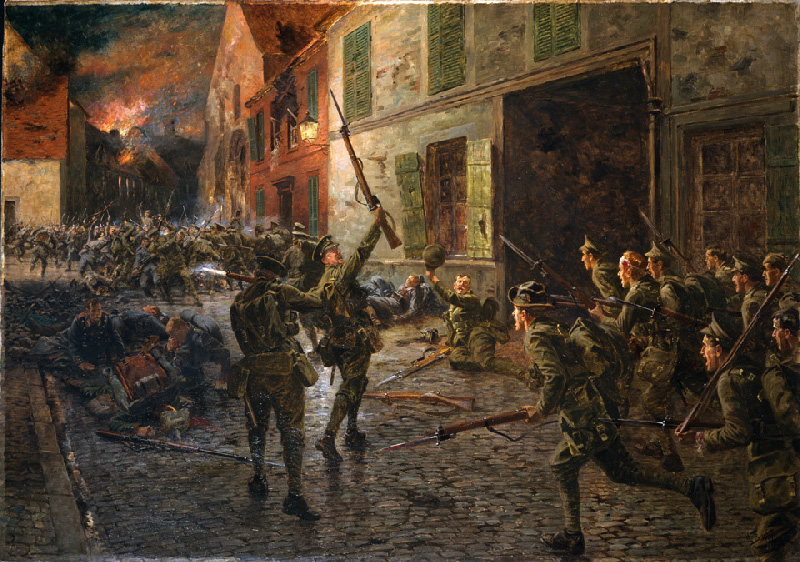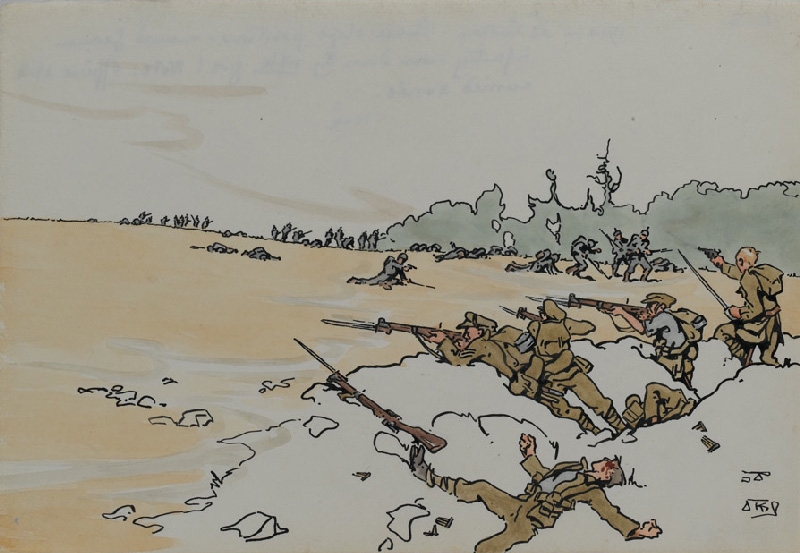Vernon Matthews of the 5th (Princess Charlotte of Wales’s) Dragoon Guards recalls the ferocity of the fighting during the Retreat from Mons and the counter-attack on the Marne.
Battle commences
Following the outbreak of war, Field Marshal Sir John French’s British Expeditionary Force (BEF) was sent across the Channel to support France. Comprising only four (later re-enforced to six) infantry and one cavalry divisions, some 90,000 men, it was tiny compared with the German and French armies. Even so it was to play a role out of all proportion to its numbers.
On arrival it entrained to a concentration area on the left of the French Fifth Army near Maubeuge on the Belgian frontier. This placed the BEF squarely in the path of the German First Army as it advanced through Belgium. On 22 August 1914, warned of the German advance by cavalry patrols, the BEF took up a defensive position around Mons. The following day the Germans blundered into them. They were stopped by accurate British rifle fire and suffered heavy casualties.
Despite the success at Mons, the BEF’s right flank was exposed by the withdrawal of the French Fifth Army and it was forced to fall back as well. On 25 August the French Commander, General Joseph Joffre, ordered a withdrawal to the River Marne. During the next 10 days the BEF carried out a 200-miles (320km) fighting retreat in hot weather. The BEF suffered thousands of casualties in a series of holding actions at Landrécies (25 August), Le Cateau (26 August), Etreux (27 August), Cerizy (28 August), Néry (1 September), Crepy (1 September) and Villers-Cotterêts (1 September).
At this point Field Marshal French seems to have suffered a temporary loss of nerve. He decided that his troops needed to be pulled out of the line for a rest. Aware of the impact that this would have on Anglo-French relations, Field Marshal Earl Kitchener, the Secretary of State for War, intervened in person and overruled him. On 3 September the BEF withdrew across the Marne.
Believing that the French Fifth Army and the BEF were now beaten, the Germans decided to wheel east rather than west of Paris. This exposed their flank to a counter-attack on 5 September. The BEF marched into the gap between the German First and Second Armies and in the following week helped drive them back to the River Aisne.
‘The ferocity of the War was tremendous’
Oral history interview with Major Vernon Matthews, 5th (Princess Charlotte of Wales’s) Dragoon Guards and The Leicestershire Regiment, recorded at the Royal Star and Garter Home, Richmond-upon-Thames, 1987
NAM. 1989-08-113-4
‘We arrived at Le Havre, reformed. The divisional commander then was Major-General Allenby. Our brigade commander was Brigadier Briggs, and in our brigade we had the Queen’s Bays, 11th Hussars and L Battery of the Royal Horse Artillery. Every brigade had a battery of Royal Horse Artillery attached to them, so they were a part of the brigade.
‘We got through Le Havre and after settling down and getting everything settled, prepared, transport, food, everything. There were no motor cars in those days, it was all horse-drawn. We then rode from Le Havre to Mons.
‘I don’t quite remember the places we went through because it was all new. It was new to me. I was a sergeant and it was new to most people, but the lucky thing was that I was able to speak a little French, not much, but I somehow or other knew more than some of the officers. I used to be sent on to make arrangements for billeting the squadron, buying hay or requisitioning anything we wanted on the way. They were jobs that were given to me at the time.
‘We arrived in Mons on Sunday 23 August 1914. It was not empty. There had been no shelling. The Germans had not got to Mons. So we got to Mons without any casualties at all. I remember very well riding through the streets, and the general public were out, and the women had barrels, baskets, and as we passed they gave us stuff to eat, bread and jam, cake, and of course some of them had wine, I didn’t touch it. The order was that men were not allowed to have any.
‘Well, we got through Mons and we turned left having got there, and the Germans were away to the right, north of Mons, and we made a big left turn away. Nothing happened on that Sunday, but Monday morning, early in the morning, we were suddenly shelled. There weren’t aeroplanes in those days, bombers, you just heard the German planes, single-seaters that came over on reconnaissance. They came over to see where you were, just one that’s all, or two. And when they saw troops below they fired a rocket. The German artillery watching them, took the range on to the rocket. Well, of course, when they did that and fired the shell we lost people. Villages were being shelled. They were not alight at that moment.
‘We were coming back, we were being driven back. It’s a great retreat. But no one must think it was a great victory. The victory came when we got to the end when we turned. The actual retreat itself was a defeat. The Germans were all over the place, cavalry of course, under a General Von Kluck. He was supposed to have been one of the brilliant cavalry leaders in the German Army under the Kaiser. But you don’t see the general when you are fighting, but his troops, the ones fighting us were the 9th Uhlans, their lancers, because we captured a lot of their horses. I actually had a German horse. My horse was killed and I caught a German officer’s horse that was loose, and it had a big 9 U stamped on its quarters.
‘Well the Germans, you found, as you galloped about, it was an open war there were no trenches, and it was nearly all cavalry. Today, of course, it’s all armoured vehicles and the whole of the last war [the Second World War] you didn’t see cavalry, it was all armoured, quite different. But in our day in ’14 it was cavalry with sword, rifle and lance, Royal Horse Artillery and the infantry with the bayonet and rifle, they were your weapons.
‘So you must understand the ferocity of the ’14 war really was tremendous: it was killing… killing hand to hand. But I don’t intend to go into detail about the killing, the death, who wants to know all that? Anyone who knows what war means, they know exactly what happens. You don’t have to be told that men were blown to pieces and they were here, there and on the wire and in trees.
‘Well, we were at Mons and we were driven back. One place I do remember we went through was Laon, I remember that very well because we stopped in the middle of the town, and some of us got off our horses and went into a shop and bought some buns or bread, just for a minute or two. But the other towns and villages we went through or skirted, I don’t remember. You weren’t there to remember that. You were there to fight and get on with the war. The name of the place meant nothing, only in later history. You lived the history of the time, but you don’t know it. But we got back through Mons and we got down to the Marne.
‘When we got there we got to a place called Néry, and the cavalry brigade seemed safe, we had lost a number of men and we got to Néry and went up the sort of plateau on to a high-ish bit of ground and we thought we were safe there, to the extent that we couldn’t be surprised. And that night we took our saddles off our horses and undressed, didn’t take boots off. But it really did seem as though we’d got to a place where we could stop.
‘On the way back from Mons, the poor infantry used to have to fight and walk back. We felt sorry and sad for them. Then on the other hand they had the same thing about us. They were very sad and sorry for the cavalry because we had to fight as they did, sometimes dismounted, and then a lot of it mounted.
‘Well, we got to Néry, and I forget – it was 1 September, and suddenly in the morning we were bombarded. The shells came over. We all got up quick, and everybody saddled their horse at once. You got dressed as quick as you could, you had your boots on, but the other things you’d taken off, your saddle – but the luck was, we were on the sort of plateau and the Germans had come and surrounded us, the German cavalry division surrounded our whole brigade at Néry, and they fired and fired but the bullets, because we were not on the same level as the Germans who were attacking us. went over us. You could hear them while you were saddling your horse, and you didn’t stop, you didn’t wonder. You just weren’t being hit so that didn’t mean anything.
‘While this was happening and we were getting ready, our brilliant Colonel Ansell rode out from the village of Néry and he was shot. We didn’t know it at the time, but he was killed.
‘Well, we saddled our horses and then we galloped away towards the Forest of Compiègne. L Battery was being shelled, and all their guns were being hit. The German artillery concentrated on our guns, L Battery. And on this particular day, without going into any detail, three Victoria Crosses were earned by personnel of L Battery, so it allows anybody listening to me to know what was happening.
‘I myself passed within 200 yards of L Battery while they were being shelled. You couldn’t do anything. We were all in the same boat. But we were not even like a regiment now. We were hardly like a squadron, we’d rather separated, and in smaller parties. That sort of thing had to happen so that you were not caught all together. How it happened of course, it wasn’t for people like me to know.
‘We all formed up again in the Forest of Compiègne and the brigade seemed to collect together because somehow or other the Germans appeared to have been surprised as much as we were. There was no fixed line like it became later in the war, so the Germans were surprised because, I think it was The Northamptonshire Regiment, that suddenly appeared, and they went over the battlefield that we had left and the Germans had gone.
‘Now we all formed as a brigade again and probably a division, we didn’t know what other people were doing, and the next thing I remember was we were on the road from Soissons to Rheims, a big main road, and I myself stood near a post, and I’m nearly sure I’m right when it said ’24km to Paris’. So it allows everybody to know exactly how close we were to Paris when this great retreat had come to a halt on the Marne.
‘Well, the order came from Sir John French that the British Army would not retire anymore, so we now knew that we had to fight on. The German Army that had driven us from Mons was well away to our left, it had come straight from Mons towards Calais and the other ports, but when it got near Paris it suddenly made a big left wheel because they thought that if Paris fell the French would give in.
‘Very lucky for us because when we turned and Haig gave the order, the German cavalry division under von Kluck was caught sideways on. Instead of facing us now it had made a big left wheel and when we attacked they were completely disordered and driven back. And from that day we advanced 30-40 miles from the Marne to the Aisne.’
Biography
Vernon George Matthews (1892-1989) was born in Windsor, Berkshire in 1892, the son of Major George Matthews and Clare Emma Matthews (nee Hopkins). Vernon had six brothers and sisters and grew up on a succession of Army establishments.
His father was an Army Riding Master and following in his footsteps, Vernon joined the 5th (Princess Charlotte of Wales’s) Dragoon Guards as a private in 1911. By the outbreak of war in August 1914 he had been promoted to sergeant. Matthews’ unit was shipped to Le Havre in France with the Cavalry Division of the BEF.
Matthews continued to serve on the Western Front until he was shot in the chest in February 1915 near Ypres. After a lengthy recovery in Britain he returned to active service and was later commissioned in January 1918. Matthews transferred to The Leicestershire Regiment and served with them for many years before joining the Army Reserve.
In later life he lived at Ethelbert Terrace, Westgate-on-Sea in Kent. Matthews rejoined his regiment from the Reserve in 1939, finally retiring from the Army in 1948 with the rank of major. He died at Wandsworth, London, in November 1989, aged 97.
Explore
- Article: Other Soldier Stories
Explore the map for similar stories
Sergeant Vernon Matthews - Windsor, Berkshire
 First World War in Focus
First World War in Focus